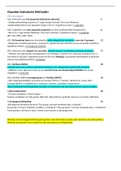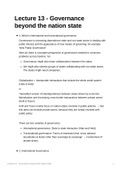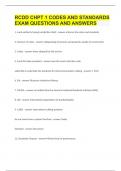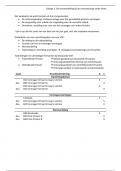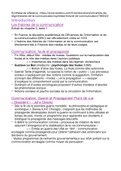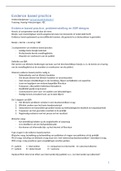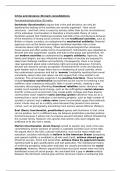1
- MARTIN TANIS -
SUMMARY OF ARTICLES&LECTURES
New Media Challenges ‘22
FOCUS: Privacy
MAIN SUBJECTS:
● What is privacy
● How does this relate to the sharing of information?
● What is the privacy paradox?
● Are we approaching a surveillance economy?
WEEK 1 - LECTURES 1,2,3 2
LECTURE 1: Introduction, utopian and dystopian views on media infiltration (Martin Tanis) 2
LECTURE 2: Introduction to Online Privacy (Martin Tanis)
Introduction to Privacy Online - Walther J.B.
Self-disclosure in social media - Bazarova, N. N., & Choi, Y. H 4
LECTURE 3: Personalization, Privacy and Surveillance (Martin Tanis)
The role of privacy fatigue in online privacy behavior. Computers in Human Behavior - Choi, H.,
Park, J., & Jung, Y. (2021)
An in-depth analysis of privacy attitudes and privacy behaviors - Dienlin, T., & Trepte, S. (2015) 11
WEEK 5 - LECTURES 11,12,13 20
LECTURE 11: Always on: Multitasking and performance (Martin Tanis)
Causes, effects, and practicalities of everyday multitasking. Developmental Review - Carrier, L.
M., Rosen, L. D., Cheever, N. A., & Lim, A. F. (2015)
Efficient, helpful, or distracting A literature review of media multitasking in relation to academic
performance. International Journal of Educational Technology in Higher Education - May, K. E., &
Elder, A. D. (2018). 20
LECTURE 12: Information processing and credibility in the age of the internet (Martin Tanis)
Strategic political communication in election campaigns. Political communication - Strömbäck, J.,
& Kiousis, S. (2014).
The Paranoid Style of American Elections Explaining Perceptions of Electoral Integrity in an Age
of Populism. Journal of Elections, Public Opinion & Parties - Norris, Pippa, Holly Ann Garnett, and
Max Gromping.
The Cognitive and Emotional Sources of Trump Support The Case of Low-Information Voters,
New Political Science - Richard C. Fording & Sanford F. Schram (2017). 26
WEEK 6 - LECTURES 14,15 31
LECTURE 14: Selective attention, motivated reasoning, and attitude formation (health context)
(Martin Tanis)
The curious case of cyberchondria A longitudinal study on the reciprocal relationship between
health anxiety and online health information seeking. Journal - Te Poel, F., Baumgartner, S. E.,
Hartmann, T., & Tanis, M. (2016) 31
WEEK 7 - LECTURES 16,17 35
LECTURE 16: Beyond bias: hostile media effect when consuming news (Martin Tanis)
Examining the hostile media effect as an intergroup phenomenon The role of ingroup identification
and status. Journal of Communication - Hartmann, T., & Tanis, M. (2013).
We are the people and you are fake news A social identity approach to populist citizens’ false
consensus and hostile media perceptions. Communication Research - Schulz, A., Wirth, W., &
Müller, P. (2020). 35
LECTURE 17: Correting misinformation, striving for the (im)possible (Martin Tanis)
Misinformation and its correction Continued influence and successful debiasing. Psychological
science in the public interest - Lewandowsky, S., Ecker, U. K., Seifert, C. M., Schwarz, N., &
Cook, J. (2012). 39
, 2
WEEK 1 - LECTURES 1,2,3
LECTURE 1: Introduction, utopian and dystopian views on media infiltration (Martin Tanis)
This lecture:
- Is our relationship with media technology a positive or a negative one?
- How has the media landscape changed over the last decades?
How society is changed using these new forms of communication and how we can deal with those
changes. In this course we will:
-Define, describe and discuss important new challenges in the media, the public and the individual.
-Take a theory- and evidence-based approach to address these issues
-Focus on normative and ethical aspects of new developments and technological possibilities
Changes in the media landscape
What are the changes that we have seen happening the last decade?
- How we entertain ourselves (before, old fashioned broadcast tv vs now; video’s on-demand, the
gaming industry etc)
- How we inform ourselves (before; tv, newspapers all written by journalists with a professional
background vs now; social media with all kinds of people with their own opinion.)
- How we interact
- How we consume
This table shows us how the news consumption has
changed over time
On the test, you may get similar graphs of which
you should be able to describe the pattern over the
years and amongst different ages etc.
You do not have to know specific numbers.
The difference in media use/consumption amongst
different age groups. Boomers rely most on
broadcast tv (old) VS gen z who rely most on online
videos for information/ media consumption. You can
see a shift happening from the older generations to
the younger ones.
Trends in media and media use
- What is the role of journalists?
- What (or who) can we trust?
- How does this affect our society?
- What will be the relation between ‘humans and computers’ (artificial intelligence)?
A lot of things happened over time, one of the biggest is that there is a big shift from traditional
communication sources to social media. Some of the trends include:
, 3
- From push to pull: consumers choosing from a large offering of media content (such as youtube,
Netflix, all things on-demand) + from printed newspapers from one one editorial board consisting of a
set of fixed journalists to Blendle where you as a consumer can blend your own set of topics/articles
based on personal interest.
- Dissolving media boundaries: browsing the internet on phone, listening to radio on a laptop.
- Increasing interactivity (online multiplayer games, chat functions on webpages)
- Content creations by ‘consumers’; social media (writing reviews, blogs, vlogs, Instagram, Facebook)
→ everything on social media revolves around the idea that anyone can create content on the
internet, which is very different from the ‘old days’ where only journalists were able to.
These are all trends that empower us as individuals to place content online and share this with a
larger audience.
Utopian / Dystopian perspectives
UTOPIA: a community or society that possesses highly desirable or nearly perfect qualities for its
citizens.
DYSTOPIA: a community or society that is undesirable or frightening
Functions of Utopian worldview:
-Optimism about the future
-Strong belief in technological developments
-Cultural change toward individuation and individual empowerment
It is often noticed that people are either very positive (utopian) about the future or very negative
(dystopian). It is two opposites.
Industrial Revolutions, are we in the 4th?
The definition of ‘industrial revolution’:
A rapid, major change in an economy marked by the general introduction of power-driven machinery
or by an important change in the prevailing types and methods of such machines.
Within all revolutions, there were both utopian and dystopian views.
There are 3 industrial revolutions that have been taken into history - but are we in the 4th right now?
Let’s say we are.
, 4
The 4th industrial revolution (2012-..?):
‘We stand on the brink of a technological revolution that will fundamentally alter the way we live, work
and relate to one another. In its scale, scope and complexity, the transformation will be unlike anything
humankind has experienced before. We do not yet know just how it will unfold but one thing is clear;
the response to it must be integrated and comprehensive, involving all stakeholders of the global
polity, from the public and the private sectors to academia and civil society.’
-Robotics
-Artificial intelligence
-Nanotechnology
-Quantum computing
-Biotechnology
-3D printing
-The internet of things
-Autonomous vehicles
So, is our relationship with media technology a positive one or a negative one?
LECTURE 2: Introduction to Online Privacy (Martin Tanis)
Introduction to Privacy Online - Walther J.B.
Self-disclosure in social media - Bazarova, N. N., & Choi, Y. H
This lecture:
- What is privacy?
- How do we manage our privacy?
- Who are our audiences?
- Functional self-disclosure on social media
What is privacy?
- Definitions from social sciences → privacy is not a fixed thing, it comes in many forms
- Privacy is defined by cultures → national and/or cultural differences in the level of privacy
- Privacy is defined by times → the definition of privacy changes over time
- Privacy is defined by individuals → every person has a different level of privacy
Uncertainty avoidance = the extend to which a society or group relies on social norms, rules, and
procedures to minimize the unpredictability of future events. → this is very closely related to privacy
- MARTIN TANIS -
SUMMARY OF ARTICLES&LECTURES
New Media Challenges ‘22
FOCUS: Privacy
MAIN SUBJECTS:
● What is privacy
● How does this relate to the sharing of information?
● What is the privacy paradox?
● Are we approaching a surveillance economy?
WEEK 1 - LECTURES 1,2,3 2
LECTURE 1: Introduction, utopian and dystopian views on media infiltration (Martin Tanis) 2
LECTURE 2: Introduction to Online Privacy (Martin Tanis)
Introduction to Privacy Online - Walther J.B.
Self-disclosure in social media - Bazarova, N. N., & Choi, Y. H 4
LECTURE 3: Personalization, Privacy and Surveillance (Martin Tanis)
The role of privacy fatigue in online privacy behavior. Computers in Human Behavior - Choi, H.,
Park, J., & Jung, Y. (2021)
An in-depth analysis of privacy attitudes and privacy behaviors - Dienlin, T., & Trepte, S. (2015) 11
WEEK 5 - LECTURES 11,12,13 20
LECTURE 11: Always on: Multitasking and performance (Martin Tanis)
Causes, effects, and practicalities of everyday multitasking. Developmental Review - Carrier, L.
M., Rosen, L. D., Cheever, N. A., & Lim, A. F. (2015)
Efficient, helpful, or distracting A literature review of media multitasking in relation to academic
performance. International Journal of Educational Technology in Higher Education - May, K. E., &
Elder, A. D. (2018). 20
LECTURE 12: Information processing and credibility in the age of the internet (Martin Tanis)
Strategic political communication in election campaigns. Political communication - Strömbäck, J.,
& Kiousis, S. (2014).
The Paranoid Style of American Elections Explaining Perceptions of Electoral Integrity in an Age
of Populism. Journal of Elections, Public Opinion & Parties - Norris, Pippa, Holly Ann Garnett, and
Max Gromping.
The Cognitive and Emotional Sources of Trump Support The Case of Low-Information Voters,
New Political Science - Richard C. Fording & Sanford F. Schram (2017). 26
WEEK 6 - LECTURES 14,15 31
LECTURE 14: Selective attention, motivated reasoning, and attitude formation (health context)
(Martin Tanis)
The curious case of cyberchondria A longitudinal study on the reciprocal relationship between
health anxiety and online health information seeking. Journal - Te Poel, F., Baumgartner, S. E.,
Hartmann, T., & Tanis, M. (2016) 31
WEEK 7 - LECTURES 16,17 35
LECTURE 16: Beyond bias: hostile media effect when consuming news (Martin Tanis)
Examining the hostile media effect as an intergroup phenomenon The role of ingroup identification
and status. Journal of Communication - Hartmann, T., & Tanis, M. (2013).
We are the people and you are fake news A social identity approach to populist citizens’ false
consensus and hostile media perceptions. Communication Research - Schulz, A., Wirth, W., &
Müller, P. (2020). 35
LECTURE 17: Correting misinformation, striving for the (im)possible (Martin Tanis)
Misinformation and its correction Continued influence and successful debiasing. Psychological
science in the public interest - Lewandowsky, S., Ecker, U. K., Seifert, C. M., Schwarz, N., &
Cook, J. (2012). 39
, 2
WEEK 1 - LECTURES 1,2,3
LECTURE 1: Introduction, utopian and dystopian views on media infiltration (Martin Tanis)
This lecture:
- Is our relationship with media technology a positive or a negative one?
- How has the media landscape changed over the last decades?
How society is changed using these new forms of communication and how we can deal with those
changes. In this course we will:
-Define, describe and discuss important new challenges in the media, the public and the individual.
-Take a theory- and evidence-based approach to address these issues
-Focus on normative and ethical aspects of new developments and technological possibilities
Changes in the media landscape
What are the changes that we have seen happening the last decade?
- How we entertain ourselves (before, old fashioned broadcast tv vs now; video’s on-demand, the
gaming industry etc)
- How we inform ourselves (before; tv, newspapers all written by journalists with a professional
background vs now; social media with all kinds of people with their own opinion.)
- How we interact
- How we consume
This table shows us how the news consumption has
changed over time
On the test, you may get similar graphs of which
you should be able to describe the pattern over the
years and amongst different ages etc.
You do not have to know specific numbers.
The difference in media use/consumption amongst
different age groups. Boomers rely most on
broadcast tv (old) VS gen z who rely most on online
videos for information/ media consumption. You can
see a shift happening from the older generations to
the younger ones.
Trends in media and media use
- What is the role of journalists?
- What (or who) can we trust?
- How does this affect our society?
- What will be the relation between ‘humans and computers’ (artificial intelligence)?
A lot of things happened over time, one of the biggest is that there is a big shift from traditional
communication sources to social media. Some of the trends include:
, 3
- From push to pull: consumers choosing from a large offering of media content (such as youtube,
Netflix, all things on-demand) + from printed newspapers from one one editorial board consisting of a
set of fixed journalists to Blendle where you as a consumer can blend your own set of topics/articles
based on personal interest.
- Dissolving media boundaries: browsing the internet on phone, listening to radio on a laptop.
- Increasing interactivity (online multiplayer games, chat functions on webpages)
- Content creations by ‘consumers’; social media (writing reviews, blogs, vlogs, Instagram, Facebook)
→ everything on social media revolves around the idea that anyone can create content on the
internet, which is very different from the ‘old days’ where only journalists were able to.
These are all trends that empower us as individuals to place content online and share this with a
larger audience.
Utopian / Dystopian perspectives
UTOPIA: a community or society that possesses highly desirable or nearly perfect qualities for its
citizens.
DYSTOPIA: a community or society that is undesirable or frightening
Functions of Utopian worldview:
-Optimism about the future
-Strong belief in technological developments
-Cultural change toward individuation and individual empowerment
It is often noticed that people are either very positive (utopian) about the future or very negative
(dystopian). It is two opposites.
Industrial Revolutions, are we in the 4th?
The definition of ‘industrial revolution’:
A rapid, major change in an economy marked by the general introduction of power-driven machinery
or by an important change in the prevailing types and methods of such machines.
Within all revolutions, there were both utopian and dystopian views.
There are 3 industrial revolutions that have been taken into history - but are we in the 4th right now?
Let’s say we are.
, 4
The 4th industrial revolution (2012-..?):
‘We stand on the brink of a technological revolution that will fundamentally alter the way we live, work
and relate to one another. In its scale, scope and complexity, the transformation will be unlike anything
humankind has experienced before. We do not yet know just how it will unfold but one thing is clear;
the response to it must be integrated and comprehensive, involving all stakeholders of the global
polity, from the public and the private sectors to academia and civil society.’
-Robotics
-Artificial intelligence
-Nanotechnology
-Quantum computing
-Biotechnology
-3D printing
-The internet of things
-Autonomous vehicles
So, is our relationship with media technology a positive one or a negative one?
LECTURE 2: Introduction to Online Privacy (Martin Tanis)
Introduction to Privacy Online - Walther J.B.
Self-disclosure in social media - Bazarova, N. N., & Choi, Y. H
This lecture:
- What is privacy?
- How do we manage our privacy?
- Who are our audiences?
- Functional self-disclosure on social media
What is privacy?
- Definitions from social sciences → privacy is not a fixed thing, it comes in many forms
- Privacy is defined by cultures → national and/or cultural differences in the level of privacy
- Privacy is defined by times → the definition of privacy changes over time
- Privacy is defined by individuals → every person has a different level of privacy
Uncertainty avoidance = the extend to which a society or group relies on social norms, rules, and
procedures to minimize the unpredictability of future events. → this is very closely related to privacy

